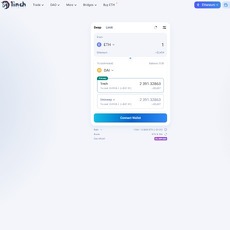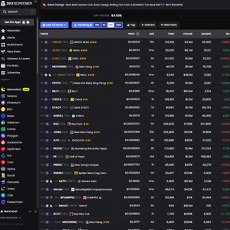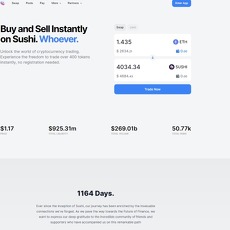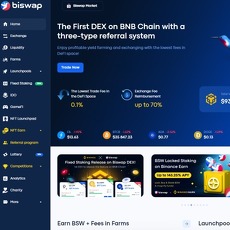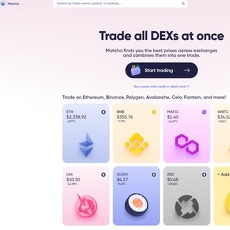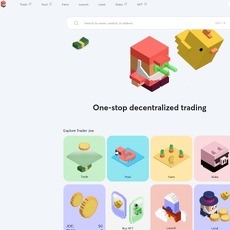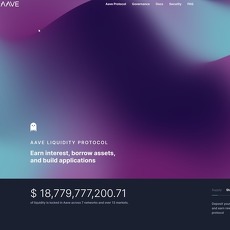Best Decentralized Exchanges (DEX) (2026) – Swap Tokens, Fees & Liquidity
DeFi, DEX, and Token Swap exchanges
Are you curious about beginning your journey within the realm of cryptocurrency investing? Are you just planning on capitalizing on some of the benefits associated with adopting cryptocurrencies as a solid option for conducting payments on a global scale? No matter what has piqued your interest within the realm of cryptocurrencies, it is clear that you will require the services of decentralized exchanges (DEXs) as a means of swapping tokens anonymously. The main point of appeal in cryptocurrencies for a lot of newcomer investors is due to the fact that they can exchange them anonymously. However, many centralized exchanges do require users to complete know-your-customer (KYC) verification processes.
As such, decentralized exchanges are here to help users trade without needing to provide the exchange with documentation about their identity. They do not even have to submit cryptocurrencies on the wallet within the exchange and can use their external wallet directly by connecting it. That said, there are a plethora of options currently available out there, and in light of this fact, this piece will give you an introduction to some of the technicalities which essentially define cryptocurrency exchanges and some of the ways through which you will be able to identify the reliable ones.
Afterwards, we will take you on a deeper dive through our review methodology, as well as our list of the top decentralized cryptocurrency exchanges that you can use to swap tokens today.
What is Decentralized Finance (DeFi)?
Decentralized Finance, otherwise referred to in short as DeFi, is a financial technology that is based on secure distributed ledgers. The main reason why this has been an appealing sector within the world of cryptocurrencies is due to the fact that it essentially eliminates any fees that banks, as well as other financial institutions, might charge in regard to the usage of their services. This essentially means that users are given the opportunity to hold their money within a secure digital wallet instead of keeping it within a bank.
Best of all, anyone that gains access to an internet connection can use DeFi services without needing any approval and can transfer funds in seconds. The components that make up Decentralized Finance (DeFi) include stablecoins, software, as well as hardware, all of which enable the development of applications. The infrastructure of DeFi and its regulation are under consistent development and debate, but it is ultimately seen by many as the future of transactions.
What is a Decentralized Exchange (DEX)?
A Decentralized exchange, or DEX for short, is a cryptocurrency exchange that operates without the requirement of a central authority. This means that users can transact cryptocurrencies through the peer-to-peer (P2P) transfer method or from one cryptocurrency wallet of User A to another cryptocurrency wallet of User B, all whilst maintaining complete control over their cryptocurrency assets.
The main point of the appeal behind these cryptocurrencies is that they reduce the risk of price manipulation, hacking, or even theft because the cryptocurrency assets are never actually in the custody of the exchange but the user directly. In other words, if you are a cryptocurrency investor that decides to use a decentralized exchange (DEX), then, in that case, you can simply transfer your cryptocurrencies directly from your wallet, and you will never be prompted to deposit your cryptocurrencies onto the exchange prior to having to make the transaction as it all occurs directly.
How does the Token Swap Procedure Work?
A decentralized exchange (DEX) is essentially this exchange that is built on top of blockchain networks, all of which support smart contract functionality and where users need to ensure and keep custody of their funds. What this essentially means is that every trade incurs a transaction fee alongside a trading fee. Traders can interact with smart contracts on the blockchain in order to utilize and enable the functionalities associated with Decentralized Exchanges (DEXs).
There are three main types of decentralized exchanges that you need to be aware of, and these are the automated market makers, the order book decentralized exchanges, and the decentralized exchange aggregators. What you need to know right away is that all of these three types of exchanges allow users to trade directly with one another through the utilization of smart contract technology.
How Do I Differentiate Between the Different Types of Cryptocurrency Exchanges Which Are Currently Available on the Market?
To get a better perspective of how you will be able to differentiate between them, we will go over each one of them individually.
Automated market makers (AMMs)
An automated market maker, or AMM for short, is essentially this system that is reliant on smart contracts and was created as a means of solving what is known as the liquidity problem.
What this means is that AMMs rely on blockchain-based services, which are intended to provide information from exchanges as well as other platforms to set the price of traded assets and are dubbed the "blockchain oracles ."What this means is that, instead of simply relying on matching buy orders and sell orders, the smart contracts of these decentralized exchanges use pre-funded pools of assets called liquidity pools. These pools are funded by other users that are fully entitled to the transaction fees, which the protocol charges as an incentive to process and execute the trades on their pair. What this means is that these liquidity providers are required to deposit an equivalent value of each asset within the trading pair as a means of earning interest on their cryptocurrency holdings, which is essentially a process called liquidity mining.
When they attempt to deposit more of a single asset than the other, the smart contract behind the pool will invalidate the transaction as a direct consequence of that. This use of liquidity pools is what allows traders to execute orders as a means of earning interest in a permissionless as well as trustless way. These exchanges will typically be ranked by the number of locked funds within their smart contracts, something you will find as a statistic called "Total Value Locked" or TVL for short.
The AMM model has a downside where there is not enough liquidity, and this is called slippage. Slippage essentially occurs when a lack of liquidity on the platform directly results in the buyer having to pay prices that are above the market on their order, where larger orders face a higher level of slippage. As a direct result of the lack of liquidity, wealthy traders might refuse to use these platforms, as the largest orders will typically have the highest slippage without deep liquidity.
Order book DEXs
Then you have order book DEXs which operate through compiling records of all open orders as a means of buying as well as selling assets for specific asset pairs. Buy orders will essentially signify that a trader is willing to buy or bid for an asset that is at a specific price point, while sell orders will indicate that a trader is ready to sell or ask a particular piece for the asset which is under consideration. The spread which occurs between these prices is a direct determination of the depth of the order book, as well as the market price on the exchange.
There are two types of order book decentralized exchanges (DEXs), on-chain order books and off-chain order books.
The DEXs which utilize order books will typically hold open order information on-chain, while the user's funds remain on their wallets. These exchanges might also provide users with the opportunity to leverage their position through the utilization of funds borrowed from lenders within the platform. Leveraged trading can also increase the earning potential within a given trade. However, it also increases the risk of liquidity as it enhances the size of the position with borrowed funds that have to be repaid, even if a trader ends up losing a bet.
DEX Aggregators
DEX aggregators essentially utilize several different protocols as well as mechanisms as a means of solving issues that are associated with liquidity. What this means is that these platforms aggregate the liquidity from several DEXs as a means of minimizing the slippage within the large orders and optimizing the swap fees as well as the token process as a means of offering any trader the best possible price within the shortest possible time. There are even DEX aggregators out there who use liquidity from centralized platforms as a means of providing users with a better overall experience, all whilst remaining fully non-custodial through leveraging an integration with specific centralized exchanges, which leads to a higher level of convenience.
The Governance Model on the Cryptocurrency Exchange
Bitcoin (BTC), as well as other cryptocurrency tokens and blockchain networks out there, have given us a heightened perspective about the possibilities associated with decentralization as well as the downsides of a centralized system. This concept, which is based on autonomy, has found its place within the exchange market as well. There are decentralized cryptocurrency exchanges that give users autonomy, alongside regard for their private keys.
A decentralized exchange is responsible for the direct communication between traders, as there is no need for intermediaries or any requirements that entail users to transfer the control of their holdings directly onto the cryptocurrency exchange platform. Here, smart contracts feature prominently as a means of dealing with issues that would trigger disputes. What this essentially means is that some of the advantages of trading on a decentralized exchange are the zero or negligible transaction fee that it offers as well as its insusceptibility to attacks and hacks, due to the fact that the platform does not actually own nor operate wallets.
By comparison, centralized exchanges, or centralized trading platforms, which are by far one of the most popular options when it comes to newcomer traders, stand as intermediaries as well as central authorities which govern the activities of the users. They also establish ecosystems, which rely on their capacity as a means of providing quick as well as secure trading infrastructure.
In return for doing so, centralized exchanges will typically charge trading fees for the transactions which are enabled within their website, which typically involves a maker fee and a taker fee. They run an exchange model, which entails users essentially using the on-exchange wallets, otherwise referred to as hot wallets, as a service before they can access the exchange itself.
However, the fact here is that in centralized exchanges, the company that built the platform controls it. This means that they can change the fees and the overall token availability. Within decentralized exchanges, however, things are a bit different. Due to the fact that many decentralized exchanges, and in fact, almost all of them feature their own cryptocurrency token, this gives control to the users. On any decentralized exchange, users can opt-in and buy or gain the native cryptocurrency token that governs it in some way. This native cryptocurrency token can prove to be advantageous to users, as it can reduce the fees that incur while the platform in question is used, or it can be used as a means for governance.
What this essentially means is that any holder of the native cryptocurrency token on the decentralized exchange can vote on the future changes on the exchange and can post proposals to change just about anything within the exchange. For example, if the majority of the native cryptocurrency token holders vote on a proposal to reduce the overall fees charged by the decentralized exchange, that vote is then passed, and the developers behind the decentralized exchange implement it.
This control is what makes decentralized exchanges so appealing for some of the most advanced traders out there, as it gives them control. Furthermore, due to the fact that the cryptocurrencies never need to enter the exchange directly and do not need to be transferred to the hot wallet on the platform, traders retain full control over their cryptocurrencies on their own, private, cryptocurrency wallet which means that they maintain a high level of security, all whilst reducing the risk of potential remote hacks.
The Type of Exchanges the Platform Enables
Another factor that needs to be taken into consideration about different exchanges is essentially the types of trades that the platform enables. Here, you will essentially need to look out for the exchange's readiness to facilitate different cryptocurrency trading pairs. Some exchanges out there will offer users a means of trading pairs that even involve FIAT currencies as well as for cryptocurrencies, but this is the case for centralized exchanges most of the time. In other words, decentralized exchanges will typically only facilitate crypto-to-crypto trades. The type of exchanges that you are essentially looking to undertake will determine the type of trading platform.
Additionally, there are exchanges that provide trading infrastructures for crypto derivatives, and what this essentially means is that traders can trade futures and even speculate on the future price movements of cryptocurrencies. These platforms can even enable margin trading, which then allows traders to leverage their positions as well as multiply their profits. Then there are even platforms that provide crowdfunding services in the form of Initial Exchange Offerings or IEOs as a means to fund new crypto projects.
These platforms will typically function as a launchpad through showcasing new projects and using their influence as a means of helping source for investors, and in return for doing so, the token issuers pay the exchange a percentage of the funds which get raised. Now that you essentially have a heightened insight into exactly what kinds of exchanges are available to cryptocurrency traders, we will begin exploring some of the questions that you need answers to before considering which exchange will fill your requirements throughout each of your various crypto activities.
Are Decentralized Exchanges Legal in Your Location?
Throughout this point in time, you might already have some perspective as to exactly what kind of legal standing cryptocurrencies and cryptocurrency exchanges have in your location. There are countries that have laid out strict regulatory standpoints in regard to crypto trading and will typically restrict the activities of cryptocurrency exchanges. For cryptocurrency traders who are located in such countries, trading or transacting with cryptocurrencies could result in penalties. As such, what you need to do prior to engaging within the process of trading cryptocurrencies is to ensure that trading cryptocurrencies are legal within your location. For people who live in countries that allow exchanges to operate, there is a need to verify that the cryptocurrency of your choice will satisfy any regulatory requirements.
Due to the fact that many nations are starting to essentially set up frameworks for their respective exchange markets, it has become more difficult than ever before for many exchange platforms to run a global business model. The credible ones typically attract users located within specific countries that have strict requirements as a result. Decentralized exchanges, however, can typically be accessed from anywhere in the world due to the fact that there is no central entity that controls them.
They typically operate through smart contracts, and users trade on the peer-to-peer (P2P), and as such, they can be used anywhere. The issue with geographical restrictions arises at the point in time where these cryptocurrencies need to be converted into FIAT currencies as a means of being withdrawn in the native cryptocurrency within the country the trader is located in, and this is where things become tricky. As such, always ensure that you lie in a geographical location and country that allows its citizens to trade cryptocurrencies.
The Efficiency of the Exchange’s Customer Relation Culture
Typically, within decentralized exchanges, you will only find a Frequently Asked Questions (FAQ) page, and rarely is there a dedicated support team that will meet any of your questions and resolve any of your issues. However, customer support services have become a standard in the business world, and this is something that carries the same level of potency with it in the exchange market as a platform's customer support culture is one of the key aspects of giving an exchange a higher level of credibility. Let's put our focus on how this is done on centralized exchanges first.
The top cryptocurrency exchanges that have a globally known brand name and identity have to set up customer support that caters to a diverse community. What this essentially means is that platforms have to offer multi-language support systems that can help users communicate their queries a lot more quickly and efficiently. This means that there are some platforms out there that will even provide their customers with 24/7 customer support and give them feedback or resolve complaints on time.
With the extremely fast-paced ecosystem found within the cryptocurrency markets, accessing quick and responsive customer support services which can resolve any potential queries that might occur can be a great way to determine how much profit you can make throughout your crypto activities, and as such, within the centralized exchange route, it is typically recommended that you pick an exchange that has a robust customer support system that includes live chat, phone support, email support and other forms of support. You can also check that the crypto trading platform is active on social media platforms, and this is where decentralized exchanges shine. Due to the fact that decentralized exchanges typically appeal to veteran cryptocurrency traders, they will typically have a wide and varied community associated with it, especially on popular crypto-related social media platforms such as Twitter or Telegram, where you can easily ask just about anyone for assistance if something were to go wrong. Additionally, due to the fact that no central entity controls the exchange and it's all based on smart contracts, the code controls everything, so there are rarely any serious issues that occur within these exchanges.
Does the Exchange Offer a Solid User-Experience, and Is It Understandable for Beginners?
Many of the current decentralized cryptocurrency exchanges which are commonly available on the market will offer several trading features which can ensure that users can gain easy access to all of the token swapping possibilities offered by the exchange in question.
A user's ability to access features on a DEX and utilize them properly plays an essential role in how quickly that specific user can capitalize on the market trends. This Is where the overall user experience enters the picture, which is a critical factor that needs to be considered when researching cryptocurrency exchanges. Here, users need to gauge their expertise when using trading tools that are found within these cryptocurrency exchanges and indicate how easy it is to actually use them and utilize them to their maximum potential. As a means of ensuring that the trading experiences are at a premium level, users need to look at the design as well as the overall layout of the platform and get an indication if it allows for easy navigation and if it is quick to load all of the required content and information that traders are interested in viewing prior to making a trade.
Most of the time, the more features an exchange has, the more complex it is to use, especially for beginners who are possibly booting up the exchange in question for the very first time. Users also need to ensure that they match up to their experience as a cryptocurrency trader to the overall performance and features of the platform. In other words, what this essentially means is that for newcomers, it is advisable to pick an exchange that has a simple-to-use user interface alongside features which are not too convoluted and one which does not showcase too much complex information in front of the eyes of the trader.
On the other end of this spectrum, however, expert traders need to look out for exchanges that are loaded with features, charting tools, indicators, notifications, and anything else they might be interested in. Regardless of what kind of level of experience a cryptocurrency trader has, it is always a solid idea to adopt a trading platform that has a quality mobile application with it, which can give you in-depth information across all of your trades no matter where you are.
Does the Exchange Support Advanced Trading?
Newcomer investors will typically have a better chance at achieving a higher level of success through simplistic user interfaces and tools which are easy to graph. However, on the opposite scale, advanced cryptocurrency traders will succeed assuming they use a platform that is loaded with a lot of features and tools, which prove to be a solid option for them and give them the information that they require at the moment in which they require it.
What this means is that advanced cryptocurrency traders will typically look for decentralized exchanges which facilitate token swaps; however, they provide them with access to a wide range of sophisticated as well as customizable charting tools. Experts need to ensure that they check that the DEX in question has complex analytical tools which will enable them to view it in both the web format of the platform alongside the native mobile application.
The main reason why a mobile application plays a major role within many DEX and token swap platforms as a whole are due to the fact that cryptocurrencies are extremely volatile currencies, and as such, if a cryptocurrency day-trader, for example, wants to maximize their profits, they always need to monitor and be aware of the cryptocurrency market.
Through the utilization of a proper cryptocurrency DEX application, they can always be alerted on any of the price changes which occur and gain an in-depth look at how far a token can either dip or raise its value depending on its historic value alongside other aspects that they have pre-configured in the graphs they view.
Should I Pick a Centralized Exchange or a Decentralized Exchange?
What you need to be aware of first before making this decision is the governance model of the cryptocurrency trading ecosystems. Centralized exchanges offer custody services, which are always subject to compliance requirements, and for their services, they push a high trading volume but charge high fees as well.
Then, you have decentralized exchanges which are a preferred option by many due to the fact that they allow you to maintain a high level of autonomy and preserve your user privacy while also evading some of the most common security threats. Custody should resonate throughout your decision-making process, and there are a few questions that you need to ask yourself prior to making a decision as to which option works best for you.
For one, is the exchange imposing a wallet infrastructure, do you remain in control of your assets, and so on. Typically, when it comes to custodial exchanges, they will offer an in-house wallet system in which you have to put your cryptocurrencies. However, it also carries a high level of security obligations. In contracts, a decentralized exchange will allow you to execute trades directly from your cryptocurrency wallet, which means that you will not have to deposit your crypto currencies within a hot wallet, whose private keys the cryptocurrency exchange in question controls, but they remain on your own private cryptocurrency wallet, where you are in full control of the cryptocurrency tokens. Another aspect that you need to take into consideration here is privacy.
If you are completely okay with undergoing security checks and can comply with the Know-Your-Customer (KYC) and Anti-Money Laundering (AML) procedure, then you will have no issues when using centralized exchanges.
While this is a critical aspect in the war against crypto frauds, there are concerns that it infringes on the privacy of traders. As a result of this, some traders have a genuine belief that decentralized exchanges are the ideal choice in terms of preserving the highest level of privacy. Alongside all of this, keep in mind that both models of governance have their advantages as well as their disadvantages, and it is left for you to pick which one suits your trading activities better.
What About the Security of the Exchange?
Looking at the security of exchange is extremely important. There have been historical events in which a lot of platforms have been compromised, so newer exchanges have to do a lot in order to ensure a high level of trust from their communities and to enable their platforms to shine. Security features, such as two-factor authentication (2FA), have become commonplace alongside these exchanges as a means of securing user accounts further.
There are also additional security precautions that can be taken as a means of ensuring that the exchange's holdings are less susceptible to hacks, especially for platforms that offer custody services. Ensure that you pick exchanges that utilize multi-signature wallets, which require the inputs of more than one individual in the authentication process. Through this system, single-point attacks are prevented from misplaced private keys. Additionally, some exchanges need to ensure that there are no loopholes within the system’s protocols.
Decentralized exchanges will, most of the time, be based on open-source technology. What this means is that anyone can audit the protocol. This means that someone somewhere has explored the project and published reviews online, and even if you are not that tech-savvy, you can go over the platform through the lens of someone who is as a result of their efforts in this regard.
How Much Do Decentralized Exchanges Charge on Each Trade?
Cryptocurrency exchanges can set any amount as their trading fee. For the sake of competition, however, many of these exchanges enable low transaction fees. As such, it is left for the end-user to analyze and differentiate one exchange from the other in terms of the trading fees within any given platform.
While these might not seem a lot in the short term, they can definitely add up in the long term. There are specific cases where exchanges offer to subsidize taker fees once the volume of trades executed within the platform gets to a specific milestone at the end of each month, and this applies to maker fees as well where traders can generate a high trading volume and get generous subsidy plans as a result of doing so. This is why, as a trader, you need to look at exchanges and try to find one which offers subsidy frameworks for such users.
What Payment Methods Are Available on Decentralized Exchanges?
Decentralized exchanges will typically only accept cryptocurrencies, and since you are never funding the account with any FIAT currency or cryptocurrency, you do not have to directly pay the platform. As a point of comparison, on centralized exchanges, you will need to make a deposit and fund your account, and this is why most centralized exchanges will offer you a wide range of payment methods. To summarize this part, decentralized exchanges will only accept cryptocurrency wallets, while centralized exchanges accept credit cards, debit cards, e-wallets, direct bank transfers, and cryptocurrency wallets.
Do Decentralized Exchanges Have a Native Token?
Most if not all decentralized exchanges will have their own native cryptocurrency token that will help power the platform. Traders who hold onto the native cryptocurrency asset can use it as a means of getting a discount on the fees, vote in the governance process, or even stake it to earn yield through the tokens.



